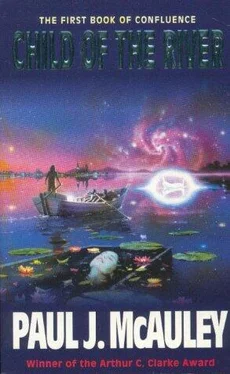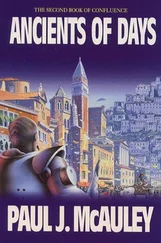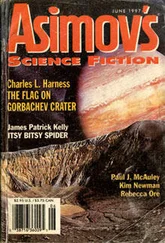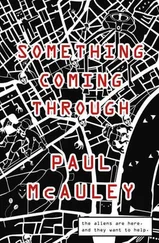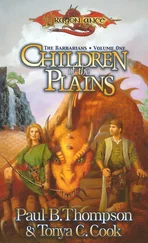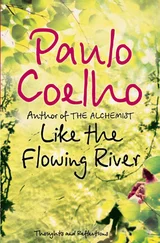Paul McAuley - Child of the River
Здесь есть возможность читать онлайн «Paul McAuley - Child of the River» весь текст электронной книги совершенно бесплатно (целиком полную версию без сокращений). В некоторых случаях можно слушать аудио, скачать через торрент в формате fb2 и присутствует краткое содержание. Год выпуска: 1997, ISBN: 1997, Издательство: Gollancz, Жанр: Фантастика и фэнтези, на английском языке. Описание произведения, (предисловие) а так же отзывы посетителей доступны на портале библиотеки ЛибКат.
- Название:Child of the River
- Автор:
- Издательство:Gollancz
- Жанр:
- Год:1997
- ISBN:0-575-06427-7
- Рейтинг книги:3 / 5. Голосов: 1
-
Избранное:Добавить в избранное
- Отзывы:
-
Ваша оценка:
- 60
- 1
- 2
- 3
- 4
- 5
Child of the River: краткое содержание, описание и аннотация
Предлагаем к чтению аннотацию, описание, краткое содержание или предисловие (зависит от того, что написал сам автор книги «Child of the River»). Если вы не нашли необходимую информацию о книге — напишите в комментариях, мы постараемся отыскать её.
Child of the River — читать онлайн бесплатно полную книгу (весь текст) целиком
Ниже представлен текст книги, разбитый по страницам. Система сохранения места последней прочитанной страницы, позволяет с удобством читать онлайн бесплатно книгу «Child of the River», без необходимости каждый раз заново искать на чём Вы остановились. Поставьте закладку, и сможете в любой момент перейти на страницу, на которой закончили чтение.
Интервал:
Закладка:
The Aedile remembered old Constable Thaw’s story. The man had shamefully confessed the whole story after his wives had delivered the foundling to the peel-house. Constable Thaw had been a coarse and cunning man, but he had taken his duties seriously.
The Aedile said, “But my dear doctor, you cannot believe that Yama killed the woman—he was just a baby.”
“Someone got rid of him,” Dr. Dismas said. “Someone who could not bear to kill him. Or was not able to kill him.”
“I have always thought that the woman was his mother. She was fleeing from something, no doubt from scandal or from her family’s condemnation, and she gave birth to him there on the river, and died. It is the simplest explanation, and surely the most likely.”
“We do not know all the facts of the case,” Dr. Dismas said. “However, I did examine the records left by my predecessor. She performed several neurological tests on Yamamanama soon after he was brought to your house, and continued to perform them for several years afterward. Counting backward, and allowing for a good margin of error, I formed the opinion that Yamamanama had been born at least fifty days before he was found on the river. We are all marked by our intelligence. Unlike the beasts of the field, we must all of us continue our development outside the womb, because the womb does not supply sufficient sensory input to stimulate growth of neural pathways. I have no reason to doubt that this is not a universal law for all intelligent races. All the tests indicated that it was no newborn baby that Constable Thaw rescued.”
“Well, no matter where he came from, or why, it seems that we are all he has, doctor.”
Dr. Dismas looked around. Although the nearest workers were fifty paces away, chipping in a desultory way at the edge of the neat square of the excavated pit, he stepped closer to the Aedile and said confidingly, “You overlook one possibility. Since the Preservers abandoned Confluence, one new race has appeared, albeit briefly.”
The Aedile smiled. “You scoff at my theory, doctor, but at least it fits with what is known, whereas you make a wild leap into thin air. The ship of the Ancients of Days passed downriver twenty years before Yama was found floating in his cradle, and no members of its crew remained on Confluence.”
“Their heresies live on. We are at war with their ideas. The Ancients of Days were the ancestors of the Preservers, and we cannot guess at their powers.” Dr. Dismas looked sideways at the Aedile. “I believe,” he said, “that there have been certain portents, certain sips . . . The rumors are vague. Perhaps you know more. Perhaps it would help if you told me about them.”
“I trust you have spoken to no one else,” the Aedile said. “Talk like this, wild though it is, could put Yama in great danger.”
“I understand why you have not discussed Yamamanama’s troublesome origin before, even to your own department. But the signs are there, for those who know how to look. The number of machines that flit at the borders of Aeolis, for instance. You cannot hide these things forever.”
The machines around the white boat. The woman in the shrine. Yama’s silly trick with the watchdogs. The bees which had fed the abandoned baby had probably been machines, too.
The Aedile said carefully, “We should not talk of such things here. It requires discretion.”
He would never tell Dr. Dismas everything. The man presumed too much, and he was not to be trusted.
“I am, and shall continue to be, the soul of discretion.”
Never before had Dr. Dismas’s dark, sharp-featured face seemed so much like a mask. It was why the man took the drug, the Aedile realized. The drug was a shield from the gaze and the hurts of the world.
The Aedile said sternly, “I mean it, Dismas. You will say nothing of what you found, and keep your speculations to yourself. I want to see what you found. Perhaps there is something you missed.”
“I will bring the papers tonight, but you will see that I am right in every particular. Now, if I may have permission to leave,” Dr. Dismas said, “I would like to recover from my journey. Think carefully about what I told you. We stand at the threshold of a great mystery.”
When Dr. Dismas had gone, the Aedile called for his secretary. While the man was preparing his pens and ink and setting a disc of red wax to soften on a sun-warmed stone, the Aedile composed in his head the letter he needed to write.
The letter would undermine Dr. Dismas’s already blemished reputation and devalue any claims the apothecary might make on Yama, but it would not condemn him outright. It would suggest a suspicion that Dr. Dismas, because of his drug habit, might be involved with the heretics who had recently tried to set fire to the floating docks, but it must be the merest of hints hedged round with equivocation, for the Aedile was certain that if Dr. Dismas was ever arrested, he would promptly confess all he knew. The Aedile realized then that they were linked by a cat’s cradle of secrets that was weighted with the soul of the foundling boy, the stranger, the sacrifice, the gift, the child of the river.
Chapter Four
Yamamanama
Yama remembered nothing of the circumstances of his birth, or of how he had arrived at Aeolis in a skiff steered by a man with a corpse at his feet and the blood of his own son fresh on his hands. Yama knew only that Aeolis was home, and knew it as intimately as only a child can, especially a child who has been adopted by the city’s Aedile and so wears innocently and unknowingly an intangible badge of privilege.
In its glory, before the Age of Insurrection, Aeolis, named for the winter wind that sang through the passes of the hills above the broad valley of the river Breas, had been the disembarkation point for the City of the Dead. Ys had extended far downriver in those days, and then as now it was the law that no one could be buried within its boundaries. Instead, mourners accompanied their dead to Aeolis, where funeral pyres for the lesser castes burned day and night, temples rang with prayers and songs for the preserved bodies of the rich and altars shone with constellations of butter lamps that shimmered amongst heaps of flowers and strings of prayer flags.
The ashes of the poor were cast on the waters of the Great River; the preserved bodies of the ruling and mercantile classes, and of scholars and dynasts, were interred in tombs whose ruined, empty shells still riddled the dry hills beyond the town. The Breas, which then had been navigable almost to its source in the foothills of the Rim Mountains, had been crowded with barges bringing slabs of land coral, porphyry, granite, marble and all kinds of precious stones for the construction of the tombs.
An age later, after half the world had been turned to desert during the rebellion of the feral machines, and the Preservers had withdrawn their blessing from Confluence, and Ys had retreated, contracting about its irreducible heart, funeral barges no longer ferried the dead to Aeolis; instead, bodies were launched from the docks and piers of Ys onto the full flood of the Great River, given up to caymans and fish, lammergeyers and carrion crows. As these creatures consumed the dead, so Aeolis consumed its own past. Tombs were looted of treasures; decorative panels and frescoes were removed from the walls; preserved bodies were stripped of their clothes and jewelry; the hammered bronze facings of doors and tomb furniture were melted down—the old pits of the wind-powered smelters were still visible along the escarpment above the little city.
After most of the tombs had been stripped, Aeolis became no more than a way station, a place where ships put in to replenish their supplies of fresh food on their voyages downriver from Ys. This was the city that Yama knew. There was the new quay which ran across the mudflats and stands of zebra grass of the old, silted harbor to the retreating edge of the Great River, where the fisherfolk of the floating islands gathered in their little coracles to sell strings of oysters and mussels, spongy parcels of red river moss, bundles of riverweed stipes, and shrimp and crabs and fresh fish. There were always people swimming off the new quay or splashing about in coracles and small boats, and men working at the fish traps and the shoals at the mouth of the shallow Breas where razorshell mussels were cultivated, and divers hunting for urchins and abalone amongst the holdfasts of stands of giant kelp whose long blades formed vast brown slicks on the surface of the river. There was the long road at the top of the ruined steps of the old waterfront, where tribesmen from the dry hills of the wild shore downriver of Aeolis squatted at blanket stalls to sell fruit and fresh meat, and dried mushrooms and manna lichen, and bits of lapis lazuli and marble pried from the wrecked facings of ancient tombs. There were ten taverns and two whorehouses; the chandlers’ godowns and the farmers’ cooperative; straggling streets of mud-brick houses which leaned toward each other over narrow canals; the one surviving temple, its walls white as salt, the gilt of its dome recently renewed by public subscription. And then the ruins of the ancient mortuaries, more extensive than the town, and fields of yams and raffia and yellow peas, and flooded paddies where rice and paeonin were grown. One of the last of Aeolis’s mayors had established the paeonin industry in an attempt to revitalize the little city, but when the heretics had silenced the shrines at the beginning of the war there had been a sudden shrinkage in the priesthood and a decline in trade of the pigment which dyed their robes. These days, the mill, built at the downriver point of the bay so that its effluent would not contaminate the silty harbor, worked only one day in ten.
Читать дальшеИнтервал:
Закладка:
Похожие книги на «Child of the River»
Представляем Вашему вниманию похожие книги на «Child of the River» списком для выбора. Мы отобрали схожую по названию и смыслу литературу в надежде предоставить читателям больше вариантов отыскать новые, интересные, ещё непрочитанные произведения.
Обсуждение, отзывы о книге «Child of the River» и просто собственные мнения читателей. Оставьте ваши комментарии, напишите, что Вы думаете о произведении, его смысле или главных героях. Укажите что конкретно понравилось, а что нет, и почему Вы так считаете.
